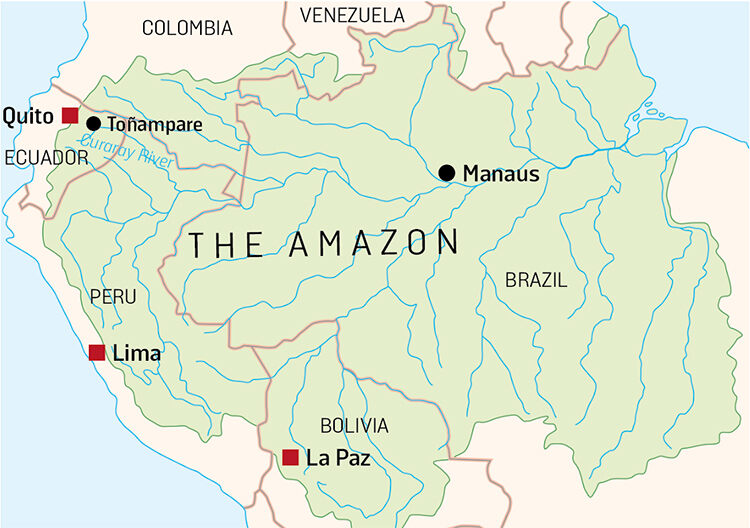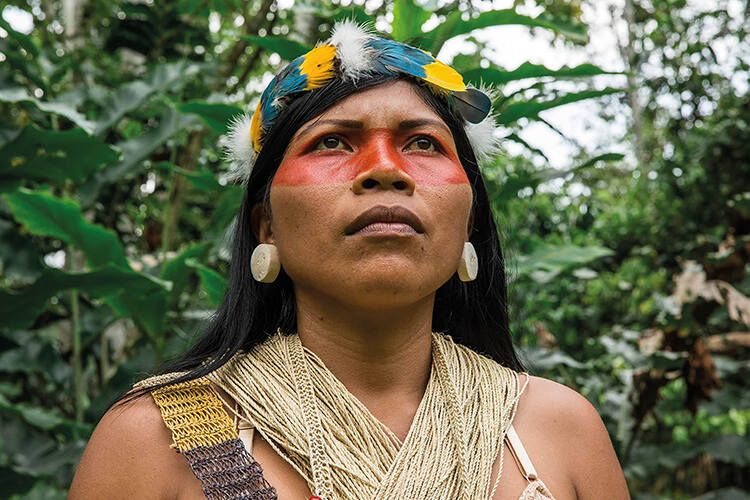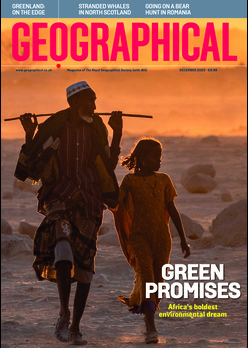
Indigenous leader and environmental activist Nemonte Nenquimo successfully fought the Ecuadorian government to protect her Amazon home from oil drilling. It was a battle born out of personal trauma and the suffering of her people
By Graeme Green
As a girl, growing up in the Ecuadorian Amazon, Nemonte Nenquimo would listen out for the drones of approaching planes, then race down to the little airstrip on the edge of her village to study the latest visitors. White Western outsiders were feared and mistrusted. Not only did they bring diseases, such as polio, which withered her uncle’s legs and killed many Indigenous people, but the incomers were also bringing seismic change to the region, from evangelical Christian missionaries trying to ‘save souls’ to oil men seeking to exploit the vast reserves beneath the rainforest. ‘I grew up with a sense that the outsiders, the cowori, were a threat,’ Nenquimo tells me.
Long before she became known as an environmental activist, fighting the Ecuadorian government to protect her Waorani people’s territory from oil drilling, Nenquimo’s childhood was a tug-of-war between new and old – the Western world, Christianity, oil, money, materialism and the promises of ‘civilisation’ in conflict with her own people’s traditional beliefs, culture and lifestyle of hunting, harvesting and living closely with the forest. An American missionary woman lived in Nenquimo’s village, Toñampare, on the Curaray River in the Pastaza province of the south-central Ecuadorian Amazon, using gifts and incentives to persuade local people, whom she referred to as ‘savages’, to attend church and convert to the alien faith, while also working with oil companies to open up the Indigenous people’s land.
‘I felt torn between two worlds in my childhood,’ 39-year-old Nenquimo says. ‘I loved being at home, playing with my brothers and sisters and all the pets my father, uncles and aunties would bring from the forest: the parrots, toucans and monkeys. But at the same time, there was the church. It was an obligation to go to church. I’d have to dress up and comb my hair. It was really boring. We’d hear from the missionary woman about Jesus, who was our “saviour”. I was always trying to figure out who this Jesus person was. The missionaries would tell my people that our customs and culture were evil and part of the Devil.’

Nenquimo wasn’t immune to the missionaries’ tactics. As she recounts in her new autobiography, We Will Not Be Saved, she was desperate for a new dress and later faked problems with her teeth, so they would be knocked out, in the hope one of the oil company’s dentists would give her a new set of neat white teeth. ‘I felt this idea of “prettiness” when I was given a dress,’ she tells me. ‘But deep inside, I also realised the missionaries were using gifts to condition the Waorani.’
The oil industry was also transforming the forest and Indigenous peoples’ culture. For the last five centuries, the Amazon has been exploited for rubber, wood, animal pelts, oil and gold. But the scale and pace of destruction increased dramatically over the past century, as governments and multinational companies worked to extract its resources, pushing the Amazon to an ecological tipping point, with severe implications not just for the region but whole the planet. Ultimatey, the Amazon is vital in the global battle to avoid the worst impacts of climate change.
Since the 1960s, the Ecuadorian government and multinational oil companies have cut roads into the heart of the Waorani’s ancestral lands to build oil platforms and pipelines, causing contamination, deforestation, and an influx of illegal loggers and gold miners, as well as cattle-ranching. Before Nenquimo’s birth in 1985, her father was working for American oil companies in the Amazon and he continued to collaborate with them throughout her childhood.

As a young girl, she was also aware of instability and violence; she listened to her relatives’ stories of Indigenous people spearing the early missionaries and the cowori shooting Indigenous people with guns, and watched the Amazon fill with outside oil workers and armed government soldiers. ‘There were planes and helicopters that came from faraway places, the oil companies coming with promises of clothes and money,’ she says. ‘I’d hear the elders saying they’re going to spear them and fight them. There was an idea that there was going to be conflict with these companies.’
The oil industry brought an atmosphere of lawlessness. It also pitted Indigenous people who were keen to work for the oil companies against others, including ‘uncontacted’ Indigenous peoples, such as the Tagaeri and the Taromenane, who opposed the oil companies’ presence (and anyone who worked for them). ‘Right from the very first moments of contact, the companies created divisions between our clans,’ Nenquimo says. ‘That continued throughout the invasion of the oil companies.’
Aged 14, Nenquimo left the forest to study with an evangelical missionary group in Quito. With new clothes and a reluctantly adopted Christian name, Inès, she was tasked with converting other Indigenous peoples, despite the fact she’d desperately tried but failed to believe in their Christian God.
Away from her mother and father, Nenquimo was repeatedly raped by the missionary in charge of looking after her, the man’s wife turning a blind eye. She wasn’t alone – at least one other girl at the same house was also being raped by the man whenever his wife went away. ‘It was a profound trauma for me that I buried for a long time,’ Nenquimo tells me. ‘In my world, there wasn’t a culture of rape or abuse of little girls or little boys. If that ever happened, the person who did that would be spear-killed. I know other little girls and Indigenous women were abused and raped by the missionaries. There have been children born from the missionaries with Waorani women, and they’ve been hidden or given away. The missions know about it and they know how to hide it very well. It’s a very strong rage that I feel. I finally decided it was time to tell my story.

After two years in the missionary’s house, Nenquimo ran away. There’s a black hole in the book of around seven years between her escape and the start of her journey into environmental activism, a dark period alluded to with references to the use of ‘pills, plant poisons and knives’ to cope with what she’d been through. ‘It was a very difficult period, very traumatic. It involved other people. It involved suicide attempts. With the story I wanted to tell, I preferred to show how I survived, healed and became a leader.’
Nenquimo’s personal pain and sense of injustice are fused into her politics, the trauma she suffered connected to the wider picture of destruction in the Amazon – the same idea of people coming in from outside, taking what they want, without permission and without caring about the harm they cause to other people. ‘My personal experience of abuse has intensified my courage, anger and desire to fight,’ she says. ‘It’s a fight to protect what I love. As a mother and a Waorani woman, I’m fighting to protect our territory, our way of life, our language, our sacred cultures, but also our children and the sanctity of our bodies. All Waorani kids and Indigenous boys and girls should be able to grow up free in the forest, as our ancestors did, not fearing that they’re going to be abused.
‘To tell stories is to be strong,’ she continues. ‘I’m telling my story so everyone in the world – the women –shouldn’t stay quiet. It’s very important to talk about the topic of abuse.’
As she recovered, Nenquimo also became more acutely aware of the destruction being caused across the region by the oil industry. ‘My strength, determination and courage to take on the oil companies started with my ability to love myself and my own body, and to feel like I was in the process of healing,’ she says. ‘It was also about feeling connected and a love for my territory and my ancestors.’

The government’s signs along Amazonian roads promised ‘Oil is progress’. But Nenquimo witnessed another reality, where rivers were poisoned, killing Indigenous peoples’ children, wiping out fish (a vital food source), and forcing people to queue for bottled drinking water. ‘Since I was a child, I’ve seen oil companies promise to extract oil and that it’s going to solve poverty,’ says Nenquimo. ‘But oil has created contamination, corruption, inequality and more impoverishment. It’s destroyed our source of life – the forest and the rivers – and created a sickness in our culture, alcoholism, and a cycle of violence in our territory. Our youth work for the oil companies, like slaves. We don’t want any more of that.’
Nenquimo was galvanised by her politically aware brother, Opi, who told her, ‘The oil companies will destroy everything. Our stories, our families, our forests, our waterfalls…’ and by other campaigning Waorani women that she started collaborating with, one of whom told her: ‘We women are the voices of the forest. If we don’t speak for our mother, no one will.’
She was convinced she could do something to stop the environmental destruction and help her people, recalling in the book her conviction: ‘I will make the oil companies tremble.’
She also formed connections with outside organisations and campaigners. In 2013, in the oil town of Coca, she met Mitch Anderson, an American human rights campaigner helping to build clean water systems for Indigenous communities. Despite her mistrust of outsiders, they started working together and later became a couple; he’s sitting beside her as we speak, translating her Spanish into English.

Together, they formed Amazon Frontlines in 2014, an organisation working to bring international attention to the devastation in the Amazon. In the same year, Nemonte was elected as the first female president of the Waorani of Pastaza and also co-founded the Ceibo Alliance, uniting different Indigenous groups, including the Siona, Siekopai and Kofan in their mission to stop oil companies drilling on their land.
After years of mapping out a vast area of the Ecuadorian Amazon and documenting the people who live there, Nenquimo took the Ecuadorian government to court over its plans to sell their ancestral territory to oil companies. Central to her lawsuit was the demand that the Ecuadorian government must engage in a process of free, prior and informed consent, according to the standards of international law and the Constitutional Court of Ecuador, before auctioning land. The historic legal decision in May 2019 protected 2,000 square kilometres of primary Amazonian rainforest in Waorani territory from oil extraction.
‘I felt very sure we were going to win because I wasn’t alone,’ says Nenquimo. ‘I was walking alongside elders, grandmas, grandpas, young leaders, children, grandchildren… I felt the strength of my ancestors. I remember crying from joy to know that our rivers and forests would be safe from oil extraction and that my children and grandchildren and future generations would be able to live well in our territory. I was also really proud that we had established a legal precedent for other Indigenous nations to say to governments and oil companies that Indigenous peoples have the right to decide what happens on their land. I also realised that, around the world, laws are written, but those laws need to be fought for and those laws need to be wielded and used.’

The Waorani’s fight for the Amazon had international support, including from Leonardo DiCaprio, who helped fund Amazon Frontlines. ‘I didn’t really know about him much but I knew the film Titanic,’ she says with a smile. ‘I didn’t know what to expect, but when I met him in person, he was just a real person. We were able to laugh together. He was funny and I was able to share with him about our culture and way of life in the forest. He’s been a great supporter over the years.’
In her book, Nenquimo also talks about the strange realisation that she’d become an international symbol, as photos of her with a red band of achiote across her face and a feather crown were seen around the world. ‘There isn’t the concept of fame in my language or culture. I don’t understand the word very deeply. But what I do feel is that I have a responsibility to leverage that visibility to show the world the struggles of Indigenous peoples. I have an opportunity to lift up other women and Indigenous leaders across the Amazon.’
In 2020, she was named in TIME’s list of the 100 most influential people in the world, the only Indigenous woman on the list. DiCaprio wrote her profile in the magazine. She was also awarded the prestigious Goldman Environmental Prize for Central and South America in the same year.

The fight didn’t come without a cost, including threats and intimidation, which is why Nenquimo, Anderson and their two children now live abroad. ‘Especially after winning this big victory against the government and the oil industry, I have felt threatened for my life on a number of occasions,’ she says. ‘We’ve even received death threats against our lawyer in the case. For the last several years, I’ve been living outside of our territory and outside of my country, in Mexico, with my family, for security reasons.’
Nenquimo continues to work as a strategic leader for Ceibo Alliance and Amazon Frontlines, travelling frequently to her people’s territory in the Amazon. Today, the Waorani Nation numbers around 5,000 people, with 54 communities spread across roughly 10,000 square kilometres of biodiverse but threatened rainforest. In August 2023, Ecuadorians voted in a historic referendum to stop oil drilling in the Amazon’s Yasuní National Park, one of the most biodiverse areas on the planet and home to Indigenous peoples, including ‘uncontacted’ Tagaeri and Taromenane. But there’s no space for complacency. ‘Ecuador’s government is seeking to push on with extractive practices, mining and oil, across the territories, and calling anyone who resists “terrorists” or “criminal groups”,’ Nenquimo explains.
She opposes the idea that oil and mining are solutions to all the region’s economic problems. ‘The oil should stay in the ground,’ she says emphatically. ‘Oil is the blood of our ancestors.’ She also objects to the presentation of Indigenous people as ‘ignorant and an obstacle to progress,’ telling me: ‘That’s not true. We have profound knowledge of the forest.’

She’s keen to see progress in the region, but on her people’s terms. ‘I want the Waorani and Indigenous people to be able to practice our culture and decide what aspects of the outside world and Western civilisation we wish to integrate in our healthcare and education. I’d like my people to be able to keep using our thousands of years of ecological knowledge and forest medicine as well as Western medicine. Instead of economies that are extractive and destructive, we want regenerative economies that are based in the knowledge Indigenous people have in the land. What we’re demanding is that we’re respected and our way of life is respected.’
Nenquimo’s keen to point out that she isn’t suggesting ‘outsiders need to be like Indigenous peoples.’ But she does feel humanity has lost its way and that there’s plenty that Western people could learn from Indigenous cultures. ‘There is a disconnect from the Earth that creates a disconnect spiritually and in terms of wellbeing. Those are the main things I feel have been lost in life in the cities. The Indigenous communities and my people reconnect day in, day out, by collecting water, food, fish… That’s a source of joy and spiritual connection to the land. It’s missing in Western civilisation.’
Forced to live outside her homeland, the tension she felt as a child, torn between two opposing worlds, has never gone away. ‘For me, life in the forest and my village continues to be healthy, powerful and spiritual,’ Nenquimo says. ‘The rhythms of the forest are deeply connected to my body, my life, my sleep and my dreams. I continue to struggle outside of the forest, even after years of adjusting. The priorities of people outside the forest are different. Water, food and spirituality aren’t prioritised as much as money, status and power. It’s all about yourself and not thinking about other people. I see that as a risk. I try to share knowledge about the forest with my two children, as the world outside is very harsh. That strengthens my fight for the Amazon, too, because I realise that if the forest is destroyed and the rivers are contaminated, we will be lost, like the rest of the world. We will stop being Waorani.’

We Will Not Be Saved by Nemonte Nenquimo and Mitch Anderson will be published on 6 June in hardback (Wildlife, £20)




